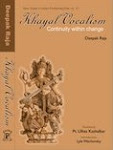 .
.In 2003, Sugata Marjit wrote to Deepak Raja about economics and music
Within economics, I specialise in international economics, development, and economics of corruption and governance. I am writing a book on trade, labour, and inequality – whether globalisation leads to increasing inequality etc. I think I am a soft-hearted human being, who feels for the poor, in spite of being an ardent supporter of market-based incentives. I am not a Marxist; I believe in God; I have taken my Deeksha [initiation] at the Ramakrishna Mission. The emotional part of me gets reflected in economics as well as music. My research is to make my points through simple, but elegant, mathematical models. I am a theorist. I believe in simplicity, and the simple is beautiful. This is the approach I take in my research and in my music.
My father had a good voice and was my inspiration. He was a Judge. We lived in several towns in West Bengal, before we finally moved to Calcutta in 1973. He used to find trainers for me [wherever we lived]. He died in 1994. I miss him a lot. He told me that anyone can be a good student academically; but to be a good vocalist is something else, and that one day, I would realise that it is a blessing to be able to sing. My uncle learnt the sitar with Balram Pathak and Imrat Khan. He was a good sitar player, but gave it up, and now runs a vocal music college in a town in West Bengal. A great talent, and inspiration for me.
I learnt with many Gurus, for a few months here and there, until I came to Calcutta. They were people who had been trained by noted Bengali musicians. One of them had, however, been trained by Vinayakrao Patwardhan [Gwalior gharana]. They had taught me basic Riyaz [Self-improvement exercises] to train my voice, and good compositions. The major taleem [training] I had was with Krishnachandra Bannerjee, for 17 years, starting from 1973. With him, I learnt singing in its totality, the intricacies of Ragadari [treatment of ragas], and the finer techniques of vocal music.
Bannerjee was a disciple of Bhishmadev Chatterjee, a household name in Bengal, who had studied with Badal Khan. That is my Rangeela gharana lineage. He [Krishnachandra Bannerjee] did not have a good voice; but he was a great trainer. I could go to him every day. He had heard top vocalists all over India, and could give me the traits of many gharanas – Kirana, Gwalior etc. Bannerjee died in 1990. I performed his funeral rites. Then, I went to TD Janorikar of the Bhendi Bazar gharana, learnt with him for a few years until he left Calcutta for Nagpur.
I am an off-beat person. I like to create all the time. I don’t want to know how many greats were born before me and, frankly speaking, be it economics or music, I get tired of knowing what has been done already, and repenting and repeating it because I am not as talented as others. I listen and try to pick up whatever sounds interesting and has the potential for my voice. I love Bhimsen Ji [Joshi] and Ameer Khan. I like possibly each and every vocalist to the extent that I can draw from them and make people dance with layakari, bol-tans, and little pieces of vistaar. I am a restless kind of guy; and so is my music, and I don’t regret it, because that’s me. I don’t like too much of structure. I like to think more about my music than physically practice it.
I like popular Bengali songs of the 1970s, and Baul [a regional folk genre of Bengal]. I often use nuances of these in my music. Often, I also use phrases of a particular raga picked up from advertising music, radio jingles etc., so long as they fit in properly. ]. I am a performer. My lectures are much better than my writing. My music is much better than my knowledge of it.
I hear all kinds of music, but don’t often get much time. Hindi music, the “old gold” type – I like a lot. Beside Ameer Khan and Bhimsen, I listen to Kishori, Paluskar, Omkarnath, Kesarbai, Kumar Gandharva [I love him!], and Rashid Khan. In instrumental music, Vilayat Khan, Ravi Shankar, Ali Akbar, Nikhil Bannerjee, Bismillah Khan, and Hariprasad Chaurasia are my favourites. Unfortunately, over the last few years, I have got so busy, that listening time is too short. I have to get back to it.
If I don’t do music with a bang now, I will fall behind in my Riyaz, my commitment. I had never guessed that I would be so successful in academics that it will tend to take away all my time. I have earned a bit, and can retire now if I wish. But, what militates against my taking up music as a profession is [the community of] musicians. There is too much of networking, hitting below the belt, and an un-intellectual ambience. I cannot accept this. I cannot go down on my knees to get a good concert. I can’t lead a musician’s life. That’s the problem. Intellectually, I am happier now. But, I am sure there is a golden mean, and I have to find it.
I have to be more consistent in my Riyaz, and start my training again, learn more and practice more. I can maintain my job in economics by doing a bit of research; but [from now on] that should be all. I have also to be in India. I have travelled far too much, and now is the time [to stay at home].
(c) India Archive Music Ltd., New York. 2003
Read a detailed profile of the artist in: "Khayal Vocalism: Continuity within Change"
The finest recordings of Sugata Marjit have been produced by India Archive Music. IndiaArcMu@aol.com.









No comments:
Post a Comment